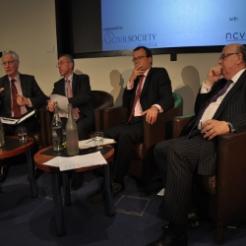Lord William Wallace of Saltaire, Cabinet Office spokesman in the House of Lords, told sector leaders yesterday that he "hopes" the government is making progress on delivering for civil society.
The Liberal Democrat peer (pictured far left) was opening the Civil Society Question Time debate yesterday with a progress report on the coalition government's first two years in power.
Wallace was a last minute stand-in at the event after minister for civil society, Nick Hurd, had to pull out for family reasons.
Wallace told delegates that it was more appropriate to ask whether the coalition government is delivering for civil society, instead of declaring that it is, "because this is a process".
"We all know you can't change policy on the ground too quickly," he said, "but I very much hope that we are making progress in a difficult time”.
He highlighted key policy initiatives such as Big Society Capital, National Citizen Service, and match funding for community endowments. He said he hoped that "by 2015 we will have a more active partnership that is more local than national - the localism agenda is very much part of that - which would help to bring more people in, not just to charitable giving, but also to local enterprise and local activity”.
Wallace added that: “The test of the Big Society agenda will be: in the long run how far can we revive local community and self get-up-and-go in some of the toughest areas?”
He explained that in recent years a "sense of dependence on state agencies" combined with hostility to those same state agencies had evolved on many council estates in Britain, and that the biggest challenge for government is getting those people to join in.
Wallace stressed that the difficult economic circumstances and the fact that public demand for high-quality public services and low taxes meant it was not possible to give any more to the sector.
Speaking later, Sir Stuart Etherington, chief executive of NCVO who was also taking part in the event, said: “Even if it was a different financial situation we would have to develop a system of mutual support above that.”
And he added: “I would like to see more of a discussion about how you generate more associational mutuality and co-operation amongst groups of citizens rather than just a contractual relationship.”
Lord Wallace agreed and said: “The demand for services is unavoidably outstripping what people are prepared to accept the government will pay for.
“We have to rebuild much more local engagement, self-help, volunteers working with public service provision in order to provide elderly care, the help for small children."










